MORE FREE TERM PAPERS MANAGEMENT:
|
|||||||||||||||||||||||||
KNOWLEDGE MANAGEMENT
 Knowledge
management is defined as a concept in which an enterprise
collects, organizes, shares, and analyzes its knowledge in terms of resources,
documents, and people skills. It involves data mining and some method
of operation to push information to users. Knowledge management could
also be a business process that formalizes management and leverage of
a firm's intellectual assets. KM is an enterprise discipline that promotes
a collaborative and integrative approach to the creation, capture, organization,
access and use of information assets, including the tacit, un-captured
knowledge of people.
Knowledge
management is defined as a concept in which an enterprise
collects, organizes, shares, and analyzes its knowledge in terms of resources,
documents, and people skills. It involves data mining and some method
of operation to push information to users. Knowledge management could
also be a business process that formalizes management and leverage of
a firm's intellectual assets. KM is an enterprise discipline that promotes
a collaborative and integrative approach to the creation, capture, organization,
access and use of information assets, including the tacit, un-captured
knowledge of people.
For educational institutes, research labs, marketing places km is treated
as backbone. Indeed in all organizations, the appropriate utilization
of knowledge towards collective intelligence and wisdom plays a vital
part in improving its own operations. These organizations seek to enforce
a discipline that can be used to systematically leverage expertise and
information to improve organizational efficiency, responsiveness, competency,
and innovation. Systematically means that the discipline does not rely
on informal water cooler conversations, but on planned processes, technology,
measurement techniques, and behaviors. Knowledge management seeks to exploit
all the key resources that an organization has in place and that can be
put to use in a more effective way.
So the biggest challenge for any business these days is to provide the
correct information that can lead to effective knowledge and can be further
used to make better decisions. Certainly, the interest in knowledge management
has grown during the last few years. Knowledge management solutions create
a platform for extensive data mining. With sharing of information across
the firm and getting the details or feedback from consumers and managers
can further help in predicting the future trend and thus take a better
decision.
A brief history of knowledge management
Many number of management theorists have contributed to the emergence
of knowledge management, among them such notables as Peter Drucker, Paul
Strassmann, and Peter Senge in the United States. Drucker and Strassmann
have focused the growing importance of information and explicit knowledge
as organizational resources, and Senge has focused on the "learning
organization," a cultural dimension of managing knowledge Everett
Rogers’ work at Stanford in the diffusion of innovation and Thomas Allen’s
research at MIT in information and technology transfer, both of which
date from the late 1970s, have also contributed to our
understanding of how knowledge is produced, used, and diffused within
organizations.
By the mid-1980s, the importance of knowledge as a competitive
asset was clear, even though classical economic theory ignores knowledge
as an asset and most organizations still lack strategies and methods for
managing it.
Recognition of the growing importance of organizational knowledge was
accompanied by worry over how to deal with exponential rise in the amount
of available knowledge and increasingly complex products and processes.
The computer technology that contributed so heavily to superabundance
of information started to become part of the solution, in a variety of
domains.
The 1980s also saw the development of systems for managing
knowledge that relied on work done in artificial intelligence and expert
systems, giving us such concepts as "knowledge acquisition,"
"knowledge engineering," "knowledge-base systems, and computer-based
ontology.
By 1990, a number of management consulting firms had
started in-house knowledge management programs, and many well known U.S.,
European, and Japanese firms had instituted focused knowledge management
programs. Knowledge management was started in the popular press in 1991,
when Tom Stewart published "Brainpower" in Fortune magazine
By the mid-1990s, knowledge management initiatives were
flourishing, thanks in part to the Internet. The International Knowledge
Management Network (IKMN), initiated in Europe in 1989, went online in
1994 and was soon joined by the U.S.-based Knowledge Management Forum
and other KM-related groups and publications. The number of knowledge
management conferences and seminars is growing as organizations focus
on managing and leveraging explicit and tacit knowledge resources to achieve
competitive advantage.
In 1994 the IKMN published the outcome of a knowledge
management survey conducted among European firms, and the European Community
began offering funding for KM-related projects through the ESPRIT program
in 1995.
Knowledge management, which appears to offer a highly desirable
alternative to failed TQM and business process re-engineering
initiatives, has become big business for such major international consulting
firms as Ernst & Young, Arthur Andersen, and Booz-Allen & Hamilton.
In addition, a number of professional organizations interested in such
related areas as benchmarking, best practices, risk management, and change
management are exploring the relationship of knowledge management to their
areas of special expertise.
Knowledge management (KM)
Knowledge is a tool to achieve strategic objectives of any organization.
Knowledge management (KM) comprises a range of practices used in an organization
to identify, create, represent, distribute and enable adoption of insights
and experiences. Such insights and experiences comprise knowledge, either
embodied in individuals or embedded in organizational processes or practice.
A short definition of knowledge management is the way that soft knowledge
becomes hard knowledge and it can become sharable between people.
Soft knowledge
Soft knowledge is most of the time in the head of people and it's a kind
of knowledge very difficult to explain on a present time. It is inside
the culture of people.
Hard knowledge
Knowledge from people's head, routine work or inside the culture can be
extract as hard knowledge. It formalizes knowledge of people in order
to be understandable by other people and shareable

Knowledge is different from information
Both are totally different from each other as:
Information
Information can be defined as related to description, definition, or perspective
(what, who, when, where). It is quite simply an understanding of the relationships
between pieces of data, or between pieces of data and other information.
While information entails an understanding of the relations between data,
it generally does not provide a foundation for why the data is what it
is, nor an indication as to how the data is likely to change over time.
Thus information has a tendency to be relatively static in time
and linear in nature.
For example: if we establish a bank savings account as the basis
for context, then interest, principal, and interest rate become meaningful
in that context with specific interpretations.
Principal is the amount of money, Rs100, in the savings account.
Interest rate, 5%, is the factor used by the bank to compute interest
on the principal.
Information is data: hard numbers about a company's profits, losses or
budgets; the phone number of someone at a competing company who can be
coerced out of some secrets.
Knowledge
Knowledge can be defined as it comprises strategy, practice, method, or
approach (how). When a pattern relation exists amidst the data and information
i.e. when one can start forming relationships between data & information,
then it has a potential to represent knowledge. It only becomes knowledge,
however, when one is able to realize and understand the patterns and their
implications.
For example: If we put Rs100 in a savings account, and the bank
pays 5% interest yearly, then at the end of one year the bank will compute
the interest of Rs 5 and add it to the principal and we will have Rs105
in the bank. This pattern represents knowledge, which, when one understands
it, allows one to understand how the pattern will evolve over time and
the results it will produce.
Types of knowledge helpful in Knowledge management
There are four kinds of knowledge helpful in knowledge management that
is:
- Personal knowledge
- Collective knowledge
- Continuous knowledge
- Economies of knowledge
Personal Knowledge
Personal knowledge is originated through the experiential exposure to
information.
The input /information can and does take many forms.
It can be of the form like conversational, reports, web sites, bogs, papers,
etc. This input is then refined based on personal experiences, expertise,
serendipity factor (Serendipity is the effect by which one accidentally
discovers something fortunate, especially while looking for something
entirely unrelated.) Which has the effect of building upon or adding to
ones existing knowledge that can then be used as new input to the cycle?
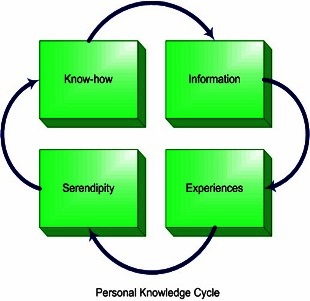
Collective Knowledge
Collective knowledge can be defined in terms of information within the
context of the organization.
It is originated by the application of context sensitive personal knowledge
derived through the personal knowledge creation cycle, as well as the
explicit information contained in systems (process and or technology-based).
Idealistically, information would be acquired, shared, and then acted
upon. This actionable information is then in turn fed back into the collective
knowledge creation cycle, and also used as input in the personal knowledge
process.
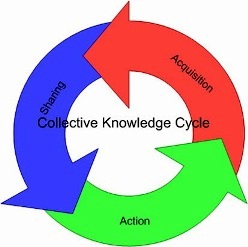
Continuous Knowledge
The personal and collective knowledge creation cycles form a semi-closed
system that will be used repeatedly as context changes.
For ex. as external input changes our personal and collective information.
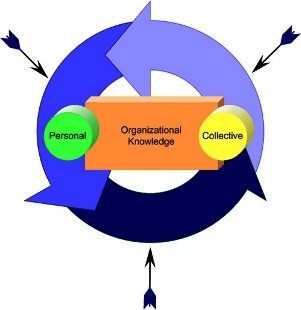
Economics of Knowledge
It is eventually helpful to view the process of Knowledge Management as
a series of transactions or activities between entities (people and or
organizations). These activities are Buying (buyers seeking knowledge),
Brokering (connecting those buying with those selling), and Selling (holders
of knowledge that are selling that knowledge). The currency of transactions
between these activities is relevant knowledge. The interesting part of
thinking in terms of an economic transaction is that each entity has the
ability to decide whether to participate in a given transaction.
-The broker can decide if there is value in connecting a buyer to
a seller.
-The seller can decide if there is value in “selling” knowledge to a buyer,
-And the buyer can decide to seek out a seller through a broker or some
other means.
NEED OF KNOWLEDGE MANAGEMENT
We can clearly understand the need of knowledge by understanding following
questions:
1. What is the knowledge in the context of the organization?
2. What are the strategic objectives of the organization?
3. What is required to be done to facilitate learning, innovation and
sharing to achieve the above objectives?
By discussing above questions we can determine need of km. following are
some of examples from which we can clearly analyze that what is need of
km in current scenario of Knowledge Management:
-Marketplaces are increasingly competitive and the rate of innovation
is rising.
-Reductions in staffing create a need to replace informal knowledge with
formal methods.
-Competitive pressures reduce the size of the work force that holds valuable
business knowledge.
-The amount of time available to experience and acquire knowledge has
diminished.
-Early retirements and increasing mobility of the work force lead to loss
of knowledge.
-There is a need to manage increasing complexity as small operating companies
are trans-national sourcing operations.
-Changes in strategic direction may result in the loss of knowledge in
a specific area.
So we can precisely say that in today’s scenario most of our work in information
and knowledge based so to manage knowledge is a tedious work. Most of
our organizations compete on the basis of knowledge. The need for life-long
learning is an inescapable reality. In brief, knowledge and information
have become the medium in which business problems occur. Products and
services are increasingly complex, endowing them with a significant information
component. As a result, managing knowledge represents the primary opportunity
for achieving substantial savings, significant improvements in human performance,
and competitive advantage. Small companies need formal approaches to knowledge
management even more, because they don’t have the market leverage, and
resources that big companies do. They have to be much more flexible, more
responsive, and more "right" (make better decisions) — because
even small mistakes can be fatal to them.
Business strategies related to knowledge management
Various strategies related with knowledge management are:
-Change management
-Best practices
-Risk management
-Benchmarking
A business community also views knowledge management as a natural extension
of "business process reengineering”, A recognition that information
and knowledge are corporate assets, and that businesses need strategies,
policies, and tools to manage those assets. The need to manage knowledge
seems obvious, and discussions of intellectual capital have proliferated,
but few businesses have acted on that understanding. Where companies have
take action — and a growing number are doing so — implementations of "knowledge
management" may range from technology-driven methods of accessing,
controlling, and delivering information to massive efforts to change corporate
culture
Implementing knowledge management
So knowledge management used gathering, organizing, refining and disseminating
processes for its implementation.
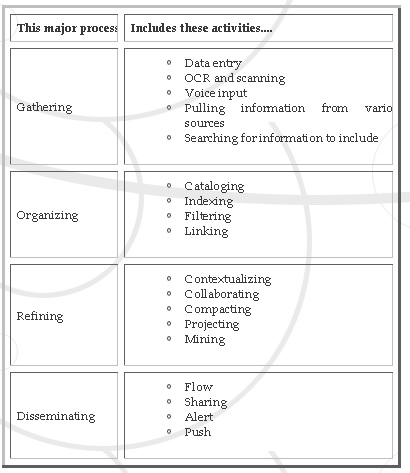
The Approach to Knowledge Management
The basic competencies required can be enlisted as:
SOCIALISE: Simply put, it is an effort to bring people
together, encourage collaborative behavior, and peer assistance and knowledge
sharing.
ENERGISE: This refers to putting in zeal to explore new
ideas, best practices and inspiring people to experiment.
COMBINE: This refers to the "BIG PICTURE" or
the "VISION" part that is taking a holistic view of all the
collaborative processes.
INTEGRATE: This is related to the combining role above
and integrates all the messages in the form of values, performance management
policies, etc.
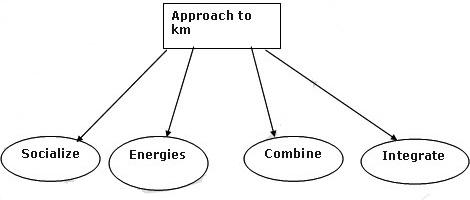
Possible benefits of knowledge management for an enterprise:
There are wide range of benefits that knowledge management provides depending on needs and strategy of organization.
Knowledge Management helps in Increasing Revenue
It helps in Open New Markets
It Enable Sustainable, Organic Growth
Knowledge Management Improve Decision-Making
It Mitigate Risk
It Develop and implement New Business Models
Knowledge Management Build More Profound relationships and ongoing Mind-Share with Customers - penetrate the mind of the customer
It Lift Productivity and Efficiency
It Speed Innovation
Knowledge Management Unleash new Ideas and Creativity
It Help create a more Adaptive, responsive, dynamic, flexible, organization
It Help create a more Adaptive, responsive, dynamic, flexible, organization
It Facilitate the evolution of a more Intelligent Enterprise and produce smart engaging products
It Use knowledge management To Build Virtual Networked Businesses.
Knowledge Management Better prepares for and anticipates The Future.
Knowledge Management Improve and accelerate Learning.
Knowledge Management Gather superior Business and Competitive Intelligence.
It Enhance Team Collaboration & Coordination.
Knowledge Management Maximize the organization's use of available collective wisdom, experience, and the Brain-Power of human capital assets.
It improves the Service and Support of Customers.
Barriers for knowledge management:
Knowledge Management to apply is difficult concept because true knowledge
is hidden and undervalued in the minds of individual employees
People feel reluctant to give up their knowledge:
It becomes vary difficult to get knowledge out of brains and into a central
repository. it becomes more difficult when they have proprietary feelings
about what they know after all knowledge is power ,and the impulse is
hoard rather than share is strong .
How we can estimate that we are moving in right direction while collecting
information for knowledge management.
Disadvantages of Knowledge Management Systems
Knowledge management is very beneficial for organization but it has many
disadvantages like:
Inability to deliver the expected performance outcomes
Usability: Some users are not capable enough to use automated tools to
get required information.
CONCLUSION
All in all we can conclude that knowledge management is going to become
vital part in today’s business scenario , to manage knowledge is tedious
job, so we analyze that socialize, energies, combine and integrate are
its main approaches. Gathering, organizing, refining disseminating are
its main components. So km is vary informative and important concept which
is highly demanding and innovative. Km is strongly focusing its feet in
today’s organizational scenario.
REFERENCES
http://www.media-access.com/whatis.html
http://en.wikipedia.org/wiki/Knowledge_management
http://www.icreon.net/knowledge-management.shtml
http://www.allkm.com/km_system/definition_knowledge_management.php
http://www.kikm.org/KM_Benefits.html

